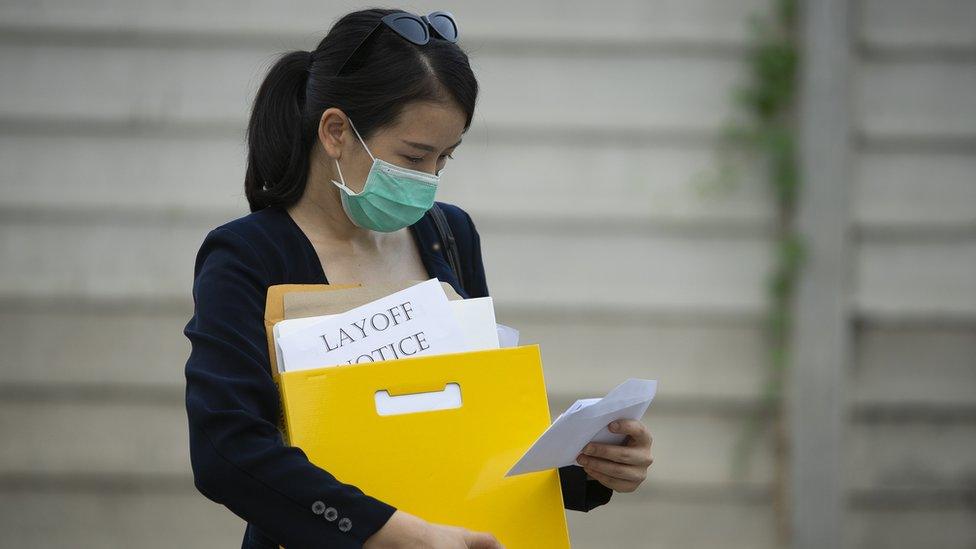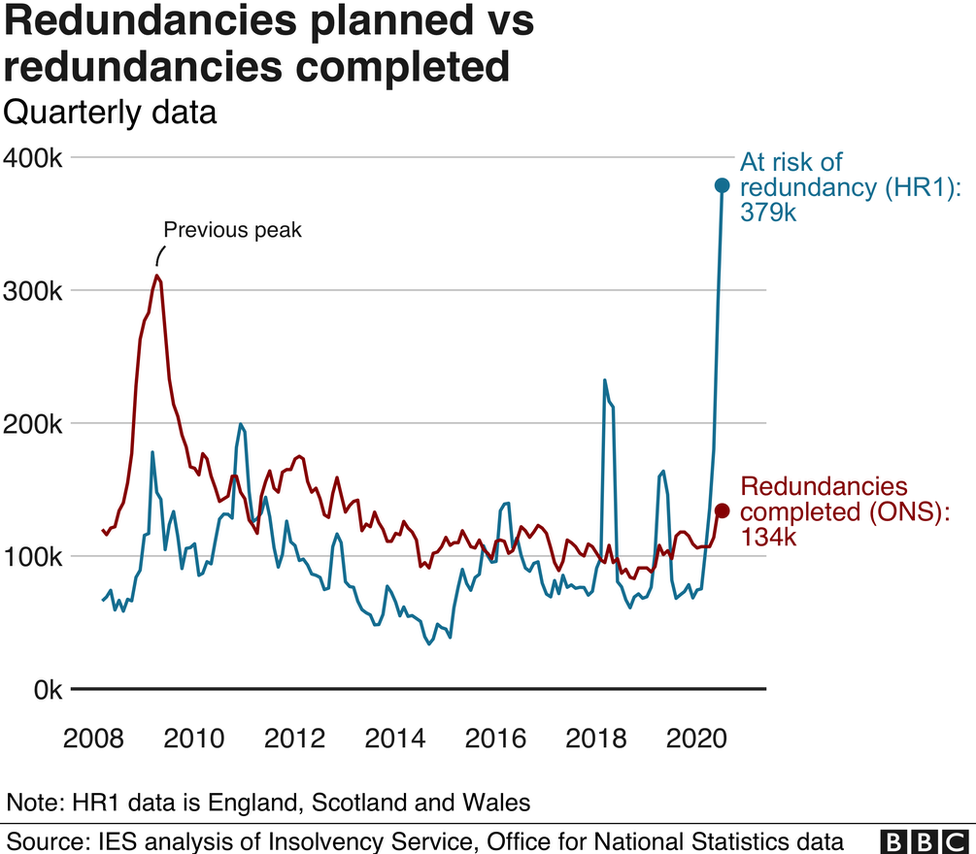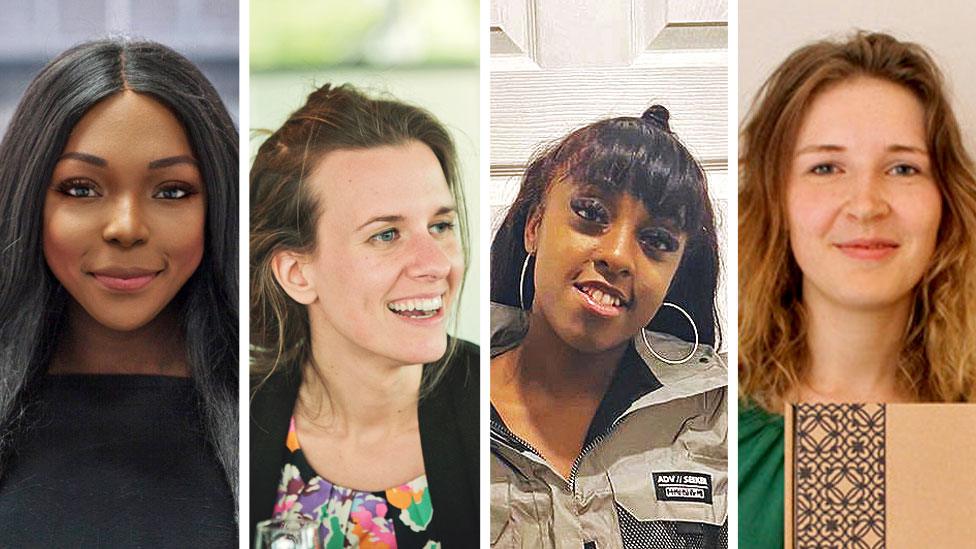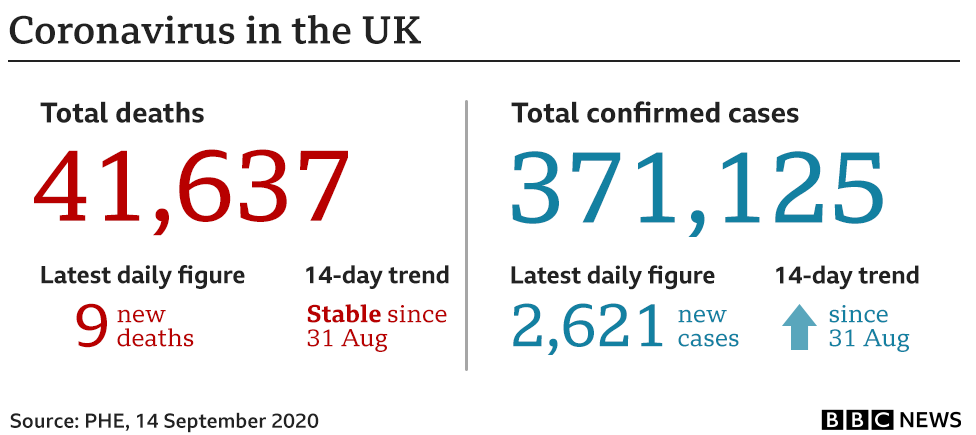Coronavirus: UK jobs latest, testing system strain and lockdown start-ups
- Published
Here are five things you need to know about the coronavirus pandemic this Tuesday morning. We'll have another update for you at 18:00 BST.
1. Latest jobs picture
We've just had the latest unemployment figures from the Office for National Statistics. The number of people on UK payrolls in August was about 695,000 lower than in March 2020. In the May to July quarter there was a particularly significant drop in the number of young people in employment. Overall, the unemployment rate grew to 4.1%, up from the previous figure of 3.9%. However, the ONS said the number of job vacancies continued to recover into August, fewer workers were on furlough and average hours worked rose. Read more on the ONS website too., external


2. Call for furlough 2.0
The furlough scheme comes to an end on 31 October, meaning those job numbers could get much worse. Labour leader Sir Keir Starmer is urging the government to replace it with a new system. It would be similar to that in Germany - explained here - rewarding employers who give people hours rather than cut jobs; providing training and support for those who can't come back full time, and targeting sectors most in need such as retail and aviation. The government says it's already implementing a plan to protect jobs - here we consider the likelihood of any extension to that.

Many planned redundancies are still to be completed and it's feared the end of furlough will bring many more

3. Testing system struggling to cope
Hospital bosses are warning that services are at risk due to staff having to self-isolate for days because they can't get tests for themselves or family members. Some patients are also not being tested in time for operations to go ahead, they say. Schools are being hit by similar problems, with head teachers warning of serious staff shortages and parents forced to keep children at home for days. The government says it's processing 200,000 tests a day on average and is working to boost that even further, with most capacity directed towards virus hotspots.
BBC Reality Check looks at why testing matters

4. Alcohol misuse 'soaring'
Experts say the number of people drinking at higher-risk levels in England rose to more than 8.4m in June - up from 4.8m in February - and the impact of that could be huge. Addiction services could struggle to cope, the Royal College of Psychiatrists is warning, and when increased demand due to the pandemic meets deep cuts already made, the result will be many patients missing out on life-saving care. Check whether your drinking habits are healthy here., external

The experts say alcohol misuse and a rise in opiate addiction are both piling pressure on services

5. Starting afresh during lockdown
The BBC is taking a close look today at the challenges of finding work during the pandemic. If you're struggling or know someone who is, get some inspiration from four women who started their own businesses during lockdown. Beauty box subscriptions, takeaway food, date night "kits" - they're succeeding despite the downturn. We also have some tips on job hunting more broadly and advice on the sectors hiring right now.

Natalie James, Charlie Pears-Wallace, Mya Wander and Caroline Haegeman all took the leap during lockdown


And don't forget...
Find more information, advice and guides on our coronavirus page.
Plus, as the UK's Jewish community prepares to celebrate its most important festivals of the year, find out more about the guidance being given to synagogues and ordinary families about how to stay safe.


What questions do you have about coronavirus?
In some cases, your question will be published, displaying your name, age and location as you provide it, unless you state otherwise. Your contact details will never be published. Please ensure you have read our terms & conditions and privacy policy.
Use this form to ask your question:
If you are reading this page and can't see the form you will need to visit the mobile version of the BBC website to submit your question or send them via email to YourQuestions@bbc.co.uk, external. Please include your name, age and location with any question you send in.

ILLEGAL LOCKDOWN RAVES: Annie Mac on Coronavirus Newscast
FOOD REVOLUTION: Is the way we produce and buy food set to change for good?
